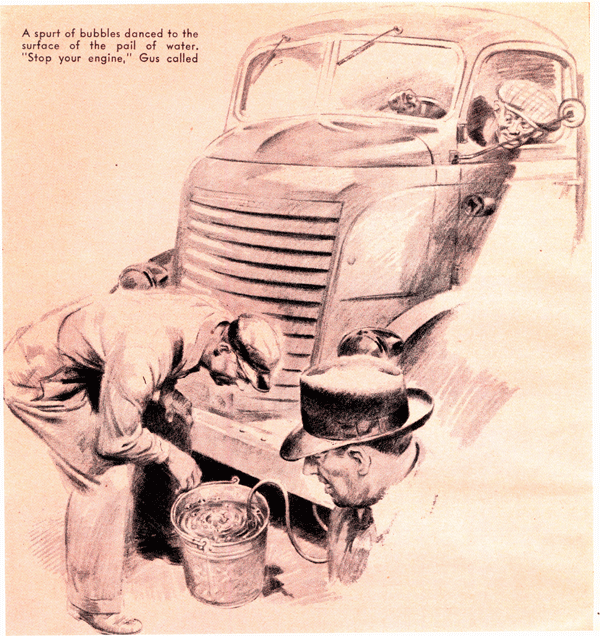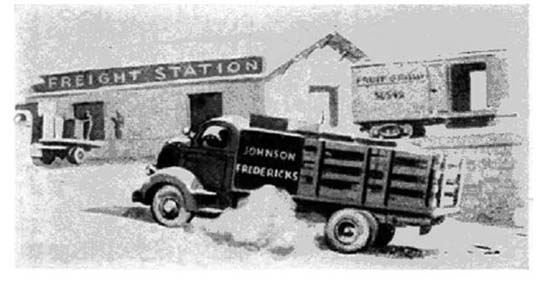February 1944
GUS FINDS TROUBLE IN BUBBLES
by Martin Bunn

"Mawnin: Mistuh Wilson."
Gus Wilson looked up from his workbench and saw Peter Jackson, the likeable colored truck driver standing just inside the doorway of the Model Garage shop.
"Hello, Peter," said Gus. "What's the matter now? Is that old rattletrap of yours acting up again?"
Peter shook his head. "I ain't drivin' that ol' truck no mo'," he said. "Mistah Dill, he promoted me to a two-ton."
"That's fine, " Gus told him. "Well, what's he matter with your two-ton?"
"There ain't no one know," Peter said gloomily. "That's why Mistah Dill tole me to bring her over here to you-all. He's a-comin' hisself, sho'tly . . . Here he is now."
John Dill, who has charge of the Johnson and Fredericks trucks, came into the shop.
"How're you doing, Mr. Dill?" Gus greeted him cheerfully.
"Apparently not very well," Dill said grouchily. "We've been having a little difficulty locating some cooling-system trouble in the truck that Peter here drives. I hadn't given up on it by any means, but last night Mr. Fredericks heard about it somehow, and told me I'd better bring the truck over here and ask you to take a look at it . . . Mr. Fredericks is the boss -- and it seems like you're the champion troubleshooter of these parts!"
Gus saw why Dill was miffed, and sympathized with him. "Oh, Mr. Fredericks was just acting out of old habit," he said lightly. "You know we used to take care of the Johnson and Fredericks fleet back in the days when it consisted of one truck, and when Fredericks thinks of trouble now, he still thinks of me. I'll check over the job with you, just to satisfy him."
Dill grunted, somewhat mollified. "Well," he said, "two heads are better than one."
Gus nodded in diplomatic agreement. "Cooling-system trouble, you said?" he suggested.
"Yes," Dill told him. "Tell Mr. Wilson what happens every morning, Peter."
"It's thisaway, Mistuh Wilson," Peter said. "When I starts mah motor in th' garage in th'mawnin', she runs fine. First job I do ev'ry day is take a load up to th' freight depot. That's only half a mile, but befo' I gets there mah motor's all het up, an' when I stop, a lot of water runs outa th' radiator overflow pipe. After that mah motor gets hotter'n hot, an' befo' long I gotta put a li'l mo' water in th' radiato. An' then I gotta keep on puttin' a lil' mo' water in it ev'ry couple of hours all day long."
"That darned truck," Dill said, "is wasting two gallons of antifreeze a week. Drive it in, Peter."
As Peter drove the truck into the shop, Gus's educated ears told him that its engine wasn't running quite perfectly. He took off the radiator cap. "No sign of overheating now," he remarked.
"No, suh, Mistuh Wilson," Peter said. "I ain't been up to th' freight depot yet -- that's why!"
"Nonsense!" Dill snapped. "What could going to the freight depot have to do with your engine overheating?"
"Mebbe," Peter said fearfully, "dat freight depot's got a hoodoo on me!"
"Nonsense!" Dill said again. "Well, Mr. Wilson -- any bright ideas?"
"Not a one, so far," Gus confessed cheerily. "In a case of overheating, the first things I always check for are late ignition timing and too lean a fuel mixture, but I suppose -- "
"You suppose dead right," Dill assured him, rather unpleasantly. "The first thing I checked was the ignition timing, and the second thing was the carburetor adjustment. They're both O.K."
Gus nodded. "Then there's the radiator core," he suggested. "When the coolant runs out of the overflow pipe, it's often an indication that there's a stoppage of circulation somewhere between the upper tank of the radiator and the intake of the water pump. Usually it's caused by the radiator core being stopped up."
Dill sneered. "That radiator's as clean as it was the day this truck left the factory. I had it checked as soon as this overheating showed up, and I had the core thoroughly flushed out. The radiator's O.K., I tell you -- I'll bet you anything you like!"
Gus grinned. "I'm a poor gambler -- I never bet unless I'm certain," he said. "Well, let's see, now . . . How about the thermostat? Sometimes that little bleeder hole -- the one that lets the air out when you're filling the cooling system while the valve is closed -- gets clogged up. When that happens, pressure from the heated water builds up behind the thermostat until all of a sudden the hot water acts on it, the valve pops wide open, and the coolant gushes up through the radiator and out of the overflow pipe."
Dill let Gus finish. Then he said: "That's real interesting, Mr. Wilson. It might happen, of course -- but it didn't happen with this truck, because we put in a new thermostat when we first had trouble, and it didn't do a bit of good."
"Peter," said Gus, "switch on your engine again, will you?"
Peter climbed into the cab, switched on the ignition, stepped on the starter, and allowed the engine to idle. Gus listened intently for a few seconds, shook his head in a disappointed way and signaled Peter to stop the engine.
"It doesn't sound the way it did when he drove the truck into the shop," he said, more to himself than to Dill. He scratched his left ear as he did a half minute of hard thinking. Then he said to Peter: "How does your truck act when you've got a full load on it, or when you're pulling up a hill? Has your truck got plenty of power?"
Peter shook his head. "No, suh, Mistuh Wilson, she ain't got th' pep what a fine bang-up truck like this here one ought to have. I done told Mistuh Dill that, but he says there ain't nothin' at all th' matter with the way she pulls."
"Just imagination!" Dill said angrily. He turned to Gus. "You were listening to the engine a minute ago. Did you ever hear a truck engine run any smoother?"
"I never heard one idle any smoother," Gus said. He raised his voice and called; "Hey, Stan!"
Stan Hicks, the grease monkey, emerged from the stockroom.
"Jack up the rear wheels of this truck, will you?" Gus said. Then he went over to his workbench and reached down a short length of rubber tubing from the shelf above it.
"She's jacked up, boss," Stan reported.
"O.K.," Gus said. "Now get me a pail of water."
Stan brought him a pail of water. Gus set it on the floor near the front end of the truck. Then he carefully worked one end of the tubing over the lower end of the radiator overflow pipe on the truck and submerged the other end of the tubing in the pail.
"Start you engine," Peter," he directed. Peter climbed back into the cab and restarted the engine. Gus was staring at the water in the pail. "Let her idle," he said. "Now put her into gear."
The truck's rear wheels began to revolve. Dill stepped over beside Gus and also stared at the water in the pail. "What's all this?" he demanded. "Nothing's happening."
"Something is going to happen in a moment," Gus told him. "Keep your eyes on the end of that tube and you'll see it . . .
Now, Peter, give her a little more gas. "That's it. Now, when I tell you to, put on your brakes -- not hard enough to kill your engine, but hard enough to make it work the way it has to when you've got a full load and you're pulling up that hill to the freight depot. Understand? O.K. -- put 'em on!"
Peter applied the brakes, lightly at first, then harder. The engine labored against their drag. A spurt of bubbles danced to the surface of the water in the pail. Gus could not conceal his satisfaction as he waved to the truck driver.
"Stop your engine!" Gus called. Then he turned to Dill. "Get it?" he asked.
"I saw some air bubbles," Dill growled. "What do you make of it?"
"When air gets into a cooling system," Gus explained, "it displaces some of the cooling fluid, which runs out through the overflow pipe. Those bubbles in the pail prove that it is air in the cooling system that has been causing the loss of coolant, and making the engine overheat."
Dill stared at him. "Maybe you're right," he said grudgingly. "But if you are right, how is the air getting into the cooling system?"
Gus motioned toward the pail. "Our little test answers that question," he said. "Those bubbles coming in a spurt show that the air is coming from one of the cylinders -- a compression leak. If the bubbles had come to the surface slowly and in a steady stream, they would have shown that the air was getting into the cooling system by way of the water-pump shaft or around a hose. When they come in a spurt it's certain proof of a compression leak. The chances are a hundred to one that you'll find a leaky head gasket causing the trouble."
Dill did some more thinking. Finally he said: "I still don't get it. Why didn't the bubbles appear until Peter put on his brakes?"
"It often happens," Gus told him, "that a head gasket doesn't leak until the engine is under load or pulling up a grade. When Peter drove the truck into the shop, my ears told me that one of the cylinders wasn't acting just right, and he gave me another clue when he said that the trouble didn't show up until he'd taken a load up to the freight depot. Applying the brakes against the engine, with the rear wheels jacked up, had the same effect on the head gasket that a full load on the road or pulling up a hill would have."
"Well," Dill said ungraciously, "we'll see. I'll get in touch with you later."
That afternoon Joe Clark called Gus to the office telephone. "This is Dill," the voice at the other end of the line said. "You were right -- it was a leaky head gasket. You're a champ troubleshooter -- I'll give you that!"
"Oh, I was just lucky -- stumbled over it," Gus said modestly. "Dinner some night . . . I'd be glad to . . . O.K. So long."
He replaced the receiver and turned to his partner. "Dill's stopped being sore at me," he said. " 'A soft answer turneth away wrath' -- who said that, Shakespeare or the Bible?"
"I wouldn't know," Joe said. "But don't you let an invite to dinner turn you away from making out a time slip for every minute on that job!"
END
L. Osbone 2019
